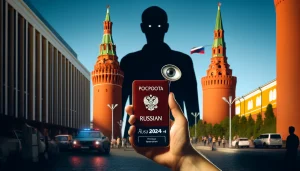- Home
- Features
- Business
- Active
- Sports
- Shop
Top Insights


In the wake of Vladimir Putin’s landslide victory in Russia’s recent presidential election, which many have labeled as preordained and lacking legitimacy, exiled opposition leader Mark Feygin is spearheading an initiative to enable Russians to anonymously register a “protest vote” against Putin using blockchain technology.
The referendum organized by locally wanted man Feygin, while lacking legal authority in Russia, aims to bolster efforts to challenge Putin’s presidency and provide Russians with a means to express dissent in a country where the consequences of opposition can be severe. This is especially pertinent following the recent death of opposition leader Alexei Navalny while imprisoned in an Arctic penal colony.
The vote will be conducted using the Russia2024 app, powered by Rarimo’s Freedom Tool, which utilizes the Arbitrum blockchain and zero-knowledge cryptography to ensure voters’ identities remain untraceable. Only Russian passport holders, estimated at around 34.6 million, will be eligible to participate.
To cast their vote, users will need to download the Russia2024 app and verify their citizenship by scanning their passports, which contain a biometric chip used to confirm the voter’s identity and facilitate an anonymous vote. The app’s backers are confident in the security of the voting process and believe that voters need not fear repercussions.
Voting in the shadow of the Ukraine war
Freedom Tool co-founder Lasha Antadze, who holds passports from Ukraine and Georgia and has previously collaborated with the Ukrainian government on digitizing state property privatization, emphasized the decentralized nature of the voting system, stating that it is designed to be resistant to attacks, blocking, or elimination.
While the Russia2024 app was initially removed from the Apple app store, it is expected to be reinstated and is currently available on Google’s app store.
The referendum comes at a time when Putin’s victory is expected to provide him with the means to continue Russia’s war against Ukraine. Antadze stressed that the technology behind the app is open-source and has received contributions from anonymous cryptography professors within Russia, describing it as a form of “wartime defense technology.”
Beyond the Russian context, Antadze believes that this technology has the potential to guarantee authenticity and significantly reduce the cost of election-related voting exercises in other nations as well:
We are handing out the open-source technology to everyone. It’s not only Ukrainians or Georgians building. […] We got a lot of contributions through anonymous letters from cryptography professors within Russia. It’s a kind of wartime defense technology.
The report follows a late 2023 investigation suggesting that the FTX crypto exchange hack may have ties to Russia.
The post Russian opposition voices dissent with blockchain vote appeared first on ReadWrite.
Recent Posts
Categories
Related Articles
Connections: Sports Edition is a New York Times word game about finding...
ByglobalreutersFebruary 22, 2025In more fandom travel and lifestyle news, pop culture stars headline LA...
ByglobalreutersFebruary 22, 2025Social media giants Meta and X approved ads targeting users in Germany...
ByglobalreutersFebruary 22, 2025






Leave a comment